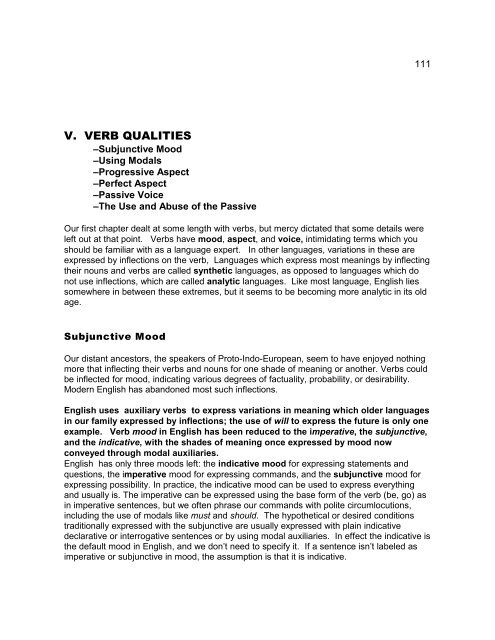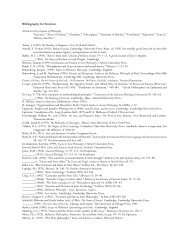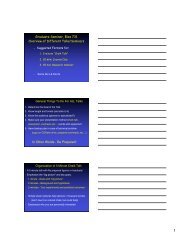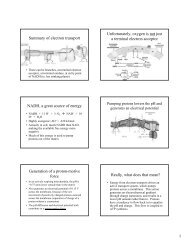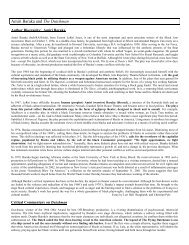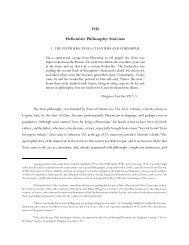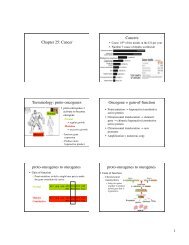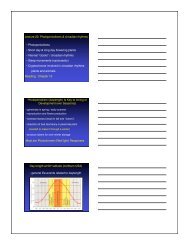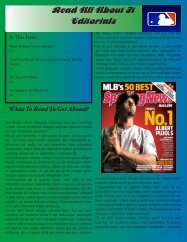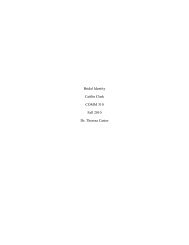V. VERB QUALITIES - UW-Parkside: Help for Personal Homepages
V. VERB QUALITIES - UW-Parkside: Help for Personal Homepages
V. VERB QUALITIES - UW-Parkside: Help for Personal Homepages
Create successful ePaper yourself
Turn your PDF publications into a flip-book with our unique Google optimized e-Paper software.
V. <strong>VERB</strong> <strong>QUALITIES</strong><br />
–Subjunctive Mood<br />
–Using Modals<br />
–Progressive Aspect<br />
–Perfect Aspect<br />
–Passive Voice<br />
–The Use and Abuse of the Passive<br />
Our first chapter dealt at some length with verbs, but mercy dictated that some details were<br />
left out at that point. Verbs have mood, aspect, and voice, intimidating terms which you<br />
should be familiar with as a language expert. In other languages, variations in these are<br />
expressed by inflections on the verb, Languages which express most meanings by inflecting<br />
their nouns and verbs are called synthetic languages, as opposed to languages which do<br />
not use inflections, which are called analytic languages. Like most language, English lies<br />
somewhere in between these extremes, but it seems to be becoming more analytic in its old<br />
age.<br />
Subjunctive Mood<br />
Our distant ancestors, the speakers of Proto-Indo-European, seem to have enjoyed nothing<br />
more that inflecting their verbs and nouns <strong>for</strong> one shade of meaning or another. Verbs could<br />
be inflected <strong>for</strong> mood, indicating various degrees of factuality, probability, or desirability.<br />
Modern English has abandoned most such inflections.<br />
111<br />
English uses auxiliary verbs to express variations in meaning which older languages<br />
in our family expressed by inflections; the use of will to express the future is only one<br />
example. Verb mood in English has been reduced to the imperative, the subjunctive,<br />
and the indicative, with the shades of meaning once expressed by mood now<br />
conveyed through modal auxiliaries.<br />
English has only three moods left: the indicative mood <strong>for</strong> expressing statements and<br />
questions, the imperative mood <strong>for</strong> expressing commands, and the subjunctive mood <strong>for</strong><br />
expressing possibility. In practice, the indicative mood can be used to express everything<br />
and usually is. The imperative can be expressed using the base <strong>for</strong>m of the verb (be, go) as<br />
in imperative sentences, but we often phrase our commands with polite circumlocutions,<br />
including the use of modals like must and should. The hypothetical or desired conditions<br />
traditionally expressed with the subjunctive are usually expressed with plain indicative<br />
declarative or interrogative sentences or by using modal auxiliaries. In effect the indicative is<br />
the default mood in English, and we don’t need to specify it. If a sentence isn’t labeled as<br />
imperative or subjunctive in mood, the assumption is that it is indicative.
Exercise 5.01--The Flexible Indicative--The following sentences are<br />
all in the indicative mood. Identify those which nevertheless<br />
express commands or hypotheticals of one sort or another:<br />
1) You must go now, or my parents will catch us.<br />
2) If they should come home be<strong>for</strong>e you go, all hell will break<br />
loose.<br />
3) You can't leave your stuff on the floor like that.<br />
4) Will you please pick it up?<br />
5) Of course I wish you could stay.<br />
6) By the way, I may have some news <strong>for</strong> you later this week.<br />
7) I might be going to the doctor.<br />
8) How would you feel about getting married?<br />
9) I only meant we should be thinking about it.<br />
10) You should hurry.<br />
Like the imperative, the present subjunctive is expressed in modern English by using<br />
the base <strong>for</strong>m of the verb, particularly in place of the third person singular.<br />
English has retained a few vestiges of the subjunctive mood, mainly <strong>for</strong> use in <strong>for</strong>mal prose.<br />
The present subjunctive is expressed by using the base <strong>for</strong>m of the verb. When the base<br />
<strong>for</strong>m is used without a subject, however, it is always interpreted as imperative in mood. In<br />
addition, with the exception of be, normal English verbs (i.e., indicatives) already use the<br />
base <strong>for</strong>m <strong>for</strong> the present plural and the first and second person present singular. The<br />
subjunctive use of the base <strong>for</strong>m, there<strong>for</strong>e, is distinctive only in the third person singular of<br />
most regular verbs. Sentences (1) through (3) below show that the subjunctive can be used<br />
in that-clauses triggered by a verb (1), an adjective (2), or noun (3) respectively:<br />
(1) They proposed that he go to China.<br />
(2) It is advisable that he go to China.<br />
(3) The general gave an order that the sentry fire without asking <strong>for</strong> a<br />
password.<br />
Sentence (4) illustrates the subjunctive's use in certain old-fashioned <strong>for</strong>mulae. Conditional<br />
clauses like those in sentences (5) and (6) can also use the subjunctive:<br />
(4) Be that as it may, I am going.<br />
(5) If that be the case, I am a dead man.<br />
(6) We must take care lest we be seen as arrogant.<br />
In modern English, the past subjunctive is pretty much confined to uses of were when<br />
one would otherwise use was.<br />
Regular English verbs have no distinctive subjunctive <strong>for</strong>m in the past tense. For the verb<br />
be, the past subjective is <strong>for</strong>med by using the plural were where one would normally find the<br />
singular was–e.g., <strong>for</strong> the first or third person past singular. This subjunctive is used in<br />
conditional or hypothetical clauses or in clauses which follow certain verbs, like wish in<br />
sentence (10):<br />
(8) If I were a rich man, I wouldn't have to sing this song.<br />
(9) He acted as though he were offended.<br />
(10) I wish this class were over.<br />
112
Exercise 5.02: Subjunctive or Not?--Identify the subjunctives or<br />
possible subjunctives in the following sentences. Watch out <strong>for</strong><br />
modals and imperatives:<br />
1) If I were king of the <strong>for</strong>est, not queen, not duke, not<br />
prince, my regal robes of the <strong>for</strong>est would be satin,not cotton,<br />
not chintz.<br />
2) Be my love, <strong>for</strong> no one else can end this yearning.<br />
3) They stopped talking lest she hear them.<br />
4) She asked that I be the one to tell him.<br />
5) If I might be so bold, you have been snoring.<br />
6) I wish I were a pair of ragged claws.<br />
7) It seems inevitable that he fail in this.<br />
8) I told him that she would leave.<br />
9) It is her plan that they wait till dawn.<br />
10) Light my fire.<br />
Using Modals<br />
While the use of the subjunctive in English has been declining, the modal auxiliary verbs<br />
have flourished. The shades of meaning conveyed by subjunctive mood–or by moods no<br />
longer present in English like optative–are generally expressed in modern English through<br />
the use of modal auxiliaries. These come with subtle shades of meaning whose exact<br />
boundaries are not always agreed on.<br />
Many of the meanings one might associate with the subjunctive are handled in English<br />
by the modal auxiliary pairs may/might and can/could, though when to use which is a<br />
matter of some debate.<br />
Despite the best ef<strong>for</strong>ts of handbooks to keep them apart, can/could and may/might overlap<br />
considerably in meaning as actually used by Standard English speakers, Such differences<br />
as one can point to often seem to have more to do with politeness and <strong>for</strong>mality than with<br />
primary meanings. People who go around “correcting” others on the use of these modals<br />
are rather obnoxious.<br />
113<br />
The modal can carries the primary sense of "be able to," and can and could are often used in<br />
just that sense:<br />
(1) I can't take it any more.<br />
(2) I couldn’t take it any more.<br />
(3) I couldn't love you more.<br />
Notice that in sentence (2) could seems to be the past tense of the can in sentence (1), but in<br />
sentence (3) it does not seem to refer to past time. That’s the kind of problem that keeps<br />
linguists from simply declaring can as present and can’t as past.<br />
By extension, can and could are used <strong>for</strong> all kinds of questions of possibility and as a polite<br />
way of seeking permission:<br />
(5) Can I have this dance?<br />
(6) Could I take you dinner sometime?<br />
The implication of these sentences is that the speaker does not wish to presume that there is
even a possibility of the implied request being granted. This humble use of can is an old and<br />
well-attested one, but it annoys those who would like the language to make more rigorous<br />
distinctions in word use. Those who feel this way would prescribe the use of may or might <strong>for</strong><br />
all cases where permission is sought. They can often be used interchangeably, without<br />
regard to tense considerations, though in general the past <strong>for</strong>ms of modals (could, might)<br />
appear somewhat more deferential:<br />
(5) May I have this dance?<br />
(6) Might I have this dance?<br />
When it comes to questions, you might want to use may/might only in highly <strong>for</strong>mal<br />
situations--or when asking an English teacher to dance. Notice, though, that they can also be<br />
used where the issue is simply possibility–thus infringing on the turf of can/could:<br />
(7) I may have offended her.<br />
(8) I might drop by your place later.<br />
114<br />
By most accounts, a Standard English sentence can have only one modal at a time. Various<br />
non-standard dialects, however, use might could and some other double modals, and use of<br />
these double modals may be coming more widespread. It is probably still safest to avoid<br />
them in <strong>for</strong>mal writing. In in<strong>for</strong>mal speech, of course, one hears the triple <strong>for</strong>m mightacoulda-woulda,<br />
with the “-a” endings representing the abbreviated have <strong>for</strong>m ‘ve, which is<br />
also responsible <strong>for</strong> the very non-standard <strong>for</strong>ms might of, could of, or would of.<br />
Some overlap in uses also occurs between the pairs will/would and shall/should.<br />
At one time school texts insisted that shall should be used <strong>for</strong> the future with the first person<br />
singular and plural and will in all other cases:<br />
(1) I shall see you soon.<br />
(2) We shall have a drink or two be<strong>for</strong>e we go.<br />
(3) He will lose his teeth that way.<br />
(4) They will want to <strong>for</strong>get this game.<br />
This usage survives, especially in British English, but Standard American English uses will in<br />
all such sentences, reserving shall <strong>for</strong> mandative uses, where it is much more <strong>for</strong>ceful than<br />
either will or should--closer, in fact, to must:<br />
(5) Meetings shall be held on alternate Fridays.<br />
Would is used in hypothetical futures, including polite requests, and is sometimes combined<br />
in that use with like:<br />
(6) I wouldn't do that if I were you.<br />
(7) Would you get me a beer while you're up?<br />
(8) Would you like to sit down?.<br />
Should is generally used interchangeably with ought to as a less <strong>for</strong>ceful <strong>for</strong>m of must and<br />
the mandative shall, one that does not assume compliance:<br />
(9) The committee shall meet every week.<br />
(10) The committee must meet every week.<br />
(11) The committee ought to meet every week.<br />
(12) The committee should meet every week.<br />
One can also find should as a rather <strong>for</strong>mal future in conditional clauses, as in sentence (13):<br />
(13) If George should come, tell him I’d like to speak with him.
In addition to its obvious uses in conveying required or necessary actions, must can<br />
also be used to suggest that a statement is a necessary conclusion under the<br />
circumstances.<br />
Like may/might, the modal must seems rather <strong>for</strong>mal <strong>for</strong> everyday use, especially in<br />
questions. Most of us would regard sentence (1) as affected and would use a sentence like<br />
(2) or (3) in in its place:<br />
(1) Must I go?<br />
(2) Should I go?<br />
(3) Do I have to go?<br />
In American English, at least, the quasi-modal have to, as in sentence (3), is gaining ground<br />
on must. If one treats the modals as having tense, as some grammarians do, must is always<br />
present, since there is no normal past equivalent <strong>for</strong> must. Sentence (4) below shows how it<br />
can be combined with other auxiliaries to deal with such problems, but sentence (5) is an<br />
easier solution.<br />
(4) I must be crazy, and I must have been crazy.<br />
(5) I have to be crazy, and I had to be crazy.<br />
115<br />
Do is often counted as a modal, since as an auxiliary it occupies a modal position, is<br />
followed by a base <strong>for</strong>m verb, and cannot occur with other modals. As such do is<br />
supplied by DO-INSERTION to bear the tense in interrogatives, negative sentences,<br />
and where emphasis is required. It can also serve as a “pro-verb” and as a normal<br />
main verb.<br />
Like the modal verbs, DO is followed by a base <strong>for</strong>m and cannot co-occur (as a modal) with<br />
other verbs, which is why we prefer to treat it as a modal auxiliary rather than a primary<br />
auxiliary. The uses of do we have seen so far are cases in which do has been supplied by<br />
DO-INSERTION to serve as a tense-bearing operator. The most common such use is in the<br />
various question <strong>for</strong>ms, where a tense element has been stranded by INVERSION, whether it<br />
is a yes/no question, a tag question, or a WH-question:<br />
(1) Did you drive to Milwaukee?<br />
(2) He drives to Milwaukee, doesn’t he?<br />
(3) Why does he drive to Milwaukee?<br />
In the absence of other auxiliaries, do also serves as a tense-bearing operator in negative<br />
sentences and in making strong assertions (the emphatic do).<br />
(4) He did not drive to Milwaukee.<br />
(5) He did drive there, I tell you!<br />
Unlike the other modals–and like the primary auxiliaries be and have–do is regularly found as<br />
the only verb in a sentence. Even then it has some unusual qualities. Much of the time it is<br />
standing <strong>for</strong> an entire antecedent predicate, rather as pronouns can stand <strong>for</strong> nouns or noun<br />
phrases. Notice that if there is more than just a verb in the predicate, do can replace the<br />
entire predicate:<br />
(6) Martha walked, and George did so too.<br />
(7) Martha ate a kumquat, but George did not.<br />
Although it may look as though do is serving as the main verb of its clause in such cases, this<br />
pro-verb use is really another example of do serving as a tense-bearer in place of other<br />
auxiliaries. If the original predicate includes an auxiliary, that verb can serve as the pro-verb,
though it may also be combined with “do so”:<br />
(8) Martha could sing well, and George could too.<br />
(9) Martha could sing well, and George could do so too.<br />
(10) Martha is singing now, and George is too<br />
(11) Martha has sung be<strong>for</strong>e, and George has done so too.<br />
As usual, be behaves like an auxiliary even when a main verb and the behavior of have as<br />
main verb is unpredictable, with either sentence (13) or sentence (14) being acceptable:<br />
(12) Martha is a soprano, and George is too.<br />
(13) Martha has a lovely voice, and George has too.<br />
(14) Martha has a lovely voice, and George does too.<br />
As a “pro-verb” or a product of DO-INSERTION, do brings no meaning of its own to the<br />
sentence. Every once in a while, however, it is a normal main verb conveying an action one<br />
is expected to deduce from the verbal context, as in the following sentences:<br />
(15) Alphonse does my hair himself.<br />
(16) Do it to me, baby, one more time.<br />
(17) Debby does Dallas.<br />
As a pro-verb or main verb, do itself requires Do-INSERTION <strong>for</strong> yes/no questions, the<br />
emphatic do, and negative sentences:<br />
(18) Did you do this?<br />
(19) Daddy did do time, .<br />
(20) I didn’t do anything.<br />
EXERCISE 5.03: Uses of DO–Say whether each use of do is a main verb,<br />
a pro-verb, or supplied by DO-insertion <strong>for</strong> an interrogative, a<br />
negative sentence, or emphasis.<br />
1) A little chocolate now and then doesn’t hurt.<br />
2) Daddy does the dishes<br />
3) Does your mother know that you’re out?<br />
4) Don’t climb a tree to look <strong>for</strong> fish.<br />
5) I do believe in life on Mars.<br />
6) My baby does me good.<br />
7) No man manages his affairs as well as a tree does.<br />
8) She told me to stop and I did.<br />
9) What if some random stranger really does want to give you<br />
money?<br />
10) Why do birds suddenly appear?<br />
Dare and need were also used as modals in older <strong>for</strong>ms of English, but these days we<br />
more commonly use expressions like dare to, need to, have to, ought to. Like be<br />
going to, have to, and used to. Such expressions are sometimes called quasi-modals<br />
or semi-modals. Such expressions are part of a larger group called quasi-auxiliaries<br />
and thus part of an even larger group called catenative verbs.<br />
Other traditional modals are need, dare, and ought to:<br />
(1) Need you go?<br />
(2) Dare you ask such a question?<br />
116
(3) Ought you to do so?<br />
One might think that ought to could be interpreted as a verb followed by an infinitive<br />
expression–you ought to do this, etc–but it is clearly in the modal position, as one can see<br />
from its inability to co-exist with other modals–e.g., we cannot say may ought to or will ought<br />
to.<br />
117<br />
Dare and need are seldom found these days and are generally replaced with dare to and<br />
need to, which we have already encountered as alternatives to must. Unlike ought to, dare to<br />
and need to are not full modals but quasi-modals (also called semi-modals). They can<br />
appear with other modals:<br />
(4) He will dare to speak the truth.<br />
(5) He will need to shave that beard.<br />
Another quasi-modal expressing obligation is have to:<br />
(6) I have to drive to Milwaukee.<br />
(7) I may have to drive to Milwaukee.<br />
Like most modals and quasi-modals, have to can be used to express future time. More<br />
explicitly linked to the future is the quasi-modal be going to. In in<strong>for</strong>mal American English,<br />
this is probably used more frequently than will to <strong>for</strong>m a kind of future “tense,” even though it<br />
can co-occur with true modals, possibly even will.<br />
(8) I am going to drive to Milwaukee tonight.<br />
(9) I may be going to drive to Milwaukee tomorrow.<br />
(10) ?I will be going to go to Milwaukee tomorrow.<br />
A final prominent quasi-modal is used to. This cannot be used to express the future, as its<br />
principal use is to imply that an action was habitual in the past. Like ought to, it does not<br />
occur along with other modals, but unlike ought to it is rarely classed as a true modal:<br />
(11) I used to drive to Milwaukee all the time.<br />
One basis <strong>for</strong> this distinction is that the first word in ought to can move in INVERSION,<br />
though it sounds rather <strong>for</strong>mal:<br />
(12) Ought I to worry about this?<br />
(13) I ought to take steps to deal with this, oughtn’t I?<br />
(14) Why ought I to do this?<br />
Used to, on the other hand requires DO-INSERTION, always in the past tense:<br />
(15) Did you used to worry about this?<br />
(16) You used to deal with this, didn’t you?<br />
(17) Why did you used to act like that?<br />
In traditional grammar, one can interpret expressions like used to as involving catenative<br />
verbs, verbs which characteristically take infinitive or gerund phrases as their object. English<br />
has a great many such verbs, some of which are used this way enough to count as at least<br />
quasi-auxiliaries. This is a more general term than quasi-modal because some quasiauxiliaries<br />
appear in place of be and have as auxiliaries. Only those catenative verbs which<br />
seem to take the place of auxiliaries are considered quasi-auxiliaries. Here are some others:<br />
(18) We were allowed to go.<br />
(19) We attempted to escape.<br />
(20) Tom avoided dancing with Martha.<br />
(21) Martha enjoyed dancing with Edgar.
(22) I <strong>for</strong>got to go to the bank.<br />
(23) I hate going to the bank, but I hate to <strong>for</strong>get stuff, too.<br />
(24) You start <strong>for</strong>getting stuff, and you start to lose it.<br />
(25) I want to tell you I love you.<br />
EXERCISE 5.04: Modals--Identify any modal auxiliaries or quasi-modal<br />
constructions in the following sentences. How do they affect the<br />
meaning of the main verb?<br />
1) I shall return.<br />
2) I should have been a pair of ragged claws.<br />
3) I have to go to the symphony tonight.<br />
4) I must have been mistaken.<br />
5) I am going to kill that guy one of these days.<br />
6) I have known him <strong>for</strong> many years.<br />
7) I can see clearly now.<br />
8) I would like to take you out tonight.<br />
9) I may be giving you a ring later.<br />
10) I could not love you more than today I do.<br />
11) I might have known he would betray me.<br />
12) I used to talk to him on MySpace.<br />
13) I was going to tell you eventually.<br />
14) I need to write myself a note.<br />
15) I will try again tomorrow.<br />
Progressive Aspect<br />
English inflects its verbs only <strong>for</strong> the past and present tense, and it <strong>for</strong>ms its “future” tense by<br />
using the modal auxiliary will. One often encounters references to additional tenses, the<br />
“present progressive,” “the past perfect,” and so on. These “tenses” actually combine a true<br />
tense (present or past) with an aspect of the verb, though we need not be quite that<br />
technical in our discussion here. The progressive and perfect aspects are <strong>for</strong>med by<br />
combining verb <strong>for</strong>ms we encountered in our earlier discussion of interrogative sentence<br />
<strong>for</strong>m, the primary auxiliaries and verb participles.<br />
Progressive aspect of a verb is signalled by be as a primary auxiliary, followed by the<br />
present participle (or ing-participle) of the next verb.<br />
We have one more use <strong>for</strong> the ing-participle of verbs; when preceded by a <strong>for</strong>m of be<br />
(including the past participle been), the ing-participle signals progressive aspect<br />
If the main tense of the sentence is present, then we have the present progressive; if it is<br />
past, we have the past progressive. Some students have difficulty in understanding that<br />
you can have a past progressive <strong>for</strong>med by a present participle. Try to remember that<br />
whether it is present or past depends on the tense of the first auxiliary verb--was drinking in<br />
sentence (2) is past progressive even though it has a "present" participle:<br />
(1) The ship is heading into a storm. [PRESENT<br />
PROGRESSIVE]<br />
118
(2) The captain was drinking heavily last night. [PAST PROGRESSIVE]<br />
(3) It will be sinking soon. [FUTURE<br />
PROGRESSIVE?]<br />
119<br />
EXERCISE 5.05: More Ing-Words: Are the highlighted -ing words<br />
participles used to <strong>for</strong>m the progressive, participles used as<br />
premodifiers, participles heading a postmodifying participial phrase,<br />
participles used as nouns (gerunds), or not participles at all?<br />
1) Annabelle was all too willing.<br />
2) Baby needs some bling-bling.<br />
3) The bells are ringing <strong>for</strong> me and my gal.<br />
4) The drum solo left a ringing in my ears.<br />
5) Tom was being rejected by Annabelle.<br />
6) Ginger thinks of herself as a caring individual.<br />
7) Harry has been walking in the <strong>for</strong>est.<br />
8) He gave her an enormous ring to make it up to her.<br />
9) His lecture was interruped by a ringing cell-phone.<br />
10) His bride, smiling in her blue-silk dress, had looked<br />
radiant.<br />
11) Hot food was served by smiling faces.<br />
12) I am just giving her a back rub.<br />
13) John had always wanted to die in the bull-ring.<br />
14) Many are smiling as they read that story.<br />
15) Sitting on the fence is his specialty.<br />
16) Smiling and belly-laughing are so relaxing.<br />
17) Susan was smiling more and more.<br />
18) Tony had been paying him hush money.<br />
19) Walking to school this morning, I talked to myself.<br />
20) We live in exciting times.<br />
The progressive gets its name because it suggests that a given action is or was in “progress”<br />
at the time we are talking about. We use the progressive more than we may realize.<br />
Standard English users rarely use the simple present tense <strong>for</strong> things which are happening<br />
as they speak. In theory, both of these sentences refer to something which is happening right<br />
now:<br />
(4) I walk to school.<br />
(5) I am walking to school.<br />
In practice, sentence (4) almost always refers to a habitual action--something which is true<br />
these days--which we may or may not be engaged in at the moment. Sentence (5) can refer<br />
to a habitual action, too, but is more apt to be used if we are, in fact, walking to school at the<br />
moment we say it, perhaps while chatting on our cell phone. To make matters a bit more<br />
confusing, either the simple present or the present progressive can be used to refer to a past<br />
action; this is called the narrative present: if we were telling an anecdotes about something<br />
that happened to us on the way to school yesterday, we might use either of the following:<br />
(6) So I walk to school, and this guy starts following me.<br />
(7) So I am walking to school, and this guy starts following me.
Remember that time and tense are not always the same thing. Either the simple present or<br />
present progressive can be used to refer to a future action by adding an appropriate<br />
adverbial:<br />
(8) I've had it with parking here. Next semester I walk to school.<br />
(9) I am walking to school tomorrow, unless you'd like to give me a ride.<br />
One might even be able to use the past progressive in a sentence like (9). Certainly, a past<br />
progressive sentence like (10) below is almost always a present-time equivalent to to the<br />
alternatives which follow:<br />
(10) I was wondering if you could bring me a beer.<br />
(11) I am wondering if you will bring me a beer.<br />
(12) I want you to bring me a beer.<br />
(13) Bring me a beer!<br />
There are some verbs and adjectives which seldom or never take the progressive. Such<br />
verbs and adjectives are called stative because they characteristically represent states of<br />
being. The opposite of stative is dynamic, a category in which most verbs and adjectives<br />
are found but a name one need not learn. Adjectives can also be classified as dynamic or<br />
stative, another way in which they resemble verbs. Explicit attention to the progressive is<br />
mainly important <strong>for</strong> non-native speakers and speakers of non-standard dialects which delete<br />
the progressive be along with the linking verb be. The <strong>for</strong>mer may produce sentences like<br />
sentence (14), misusing the progressive with a stative verb, and the latter may produce<br />
sentences like sentence (15), neither of which is acceptable Standard English:<br />
(13) ?? I am believing you now.<br />
(14) * The boss going out of his mind.<br />
In the sentence diagramed below, "getting" is a linking verb equivalent to "becoming," and<br />
"interesting" is used as an adjective. We have two verbs in this sentence, and the VP headed<br />
by "getting" is shown as a complement within the VP headed by "is." The way trees with<br />
auxiliary verbs are drawn has changed some through the years, but this is one widely<br />
accepted way. Sentences with more auxiliaries can have verbs which take verb phrases as<br />
their complement inside of verb phrases which are themselves complements of a verb, and<br />
so on.<br />
.<br />
120
You might notice that the auxiliary is has been moved under the tense/modal element in the<br />
diagram above. This seems rather unnecessary in straight-<strong>for</strong>ward declarative sentences,<br />
and is less important than treating such verbs as verbs which take full VPs as their<br />
complements. We do it here to show how one can account <strong>for</strong> the behavior of tensed<br />
auxiliaries in interrogative sentences:<br />
(15) Samson was talking with Delilah ==> Was Samson talking with Delilah?<br />
(16) He is bringing down the house ==> Is he bringing down the house?<br />
121<br />
If they are tensed verbs, the primary auxiliaries can move in front of the subject to serve as<br />
indicators of interrogative sentence <strong>for</strong>m; if the tense/modal element is already filled, as by a<br />
modal verb, then the primary auxiliaries do not move. Here, <strong>for</strong> example, is what some would<br />
call a future progressive:<br />
(17) The storm will be coming soobn ==> Will the storm be coming soon?<br />
In in<strong>for</strong>mal English, the catenative verb keep is often used as a quasi-auxiliary <strong>for</strong>ming a<br />
keep-progressive, in which the ing-participle follows keep instead of be:<br />
(18) He was walking.<br />
(19) He kept walking.<br />
(20) He is being silly.<br />
(21) He keeps being silly.<br />
The keep-progressive is actually a useful construction, rein<strong>for</strong>cing the continuous nature of<br />
the action, a sense of the progressive no longer necessarily conveyed in sentences (18) and<br />
(20) but very clear in sentences (19) and (21). Even so, keep-progressives are probably not<br />
safe <strong>for</strong> use in in<strong>for</strong>mal prose. Even more insistent, equally useful, and even less acceptable<br />
in <strong>for</strong>mal prose would be the use of keep on to <strong>for</strong>m a kind of progressive.<br />
(22) Old Man River, he keeps on rolling along.
Perfect Aspect<br />
122<br />
As a main verb, have indicates possession of some thing or quality. As an auxiliary, it<br />
combines with the past participle to <strong>for</strong>m a structure called the perfect. Like the<br />
progressive, the perfect is technically a verb aspect but often referred to as a tense.<br />
Unlike the ing-participle, the en-participle (past participle) does not confuse us by serving as<br />
a gerund. It makes up <strong>for</strong> this by being involved in both perfect aspect and passive voice.<br />
The perfect aspect has a <strong>for</strong>m of have as a primary auxiliary, followed by a past participle.<br />
The have is the real key to recognizing the perfect. When have is the only verb, it is the main<br />
verb and (loosely) denotes possession. If have is part of a string of verbs, then it is an<br />
auxiliary and it is signally the perfect.<br />
The tense of a perfect verb phrase is actually determined by the auxiliary in front of it,<br />
assuming there is no modal to confuse matters. Sentence (1) below is in the present<br />
perfect because have is a present tense <strong>for</strong>m, even though we are talking about things from<br />
the past. The past perfect equivalent would have the past tense had as in sentence (2).<br />
(1) I have often walked down this street be<strong>for</strong>e.<br />
(2) I had often walked down this street be<strong>for</strong>e.<br />
Once again, we see that the English tense-aspect system does not have a very exact<br />
relationship with real time. The perfect implies that the action was already completed<br />
(“perfected”) at the time specified by the tense. The present perfect in sentence (1) means<br />
that as of the time we are speaking we had already at some previous time walked down this<br />
street. The past perfect in sentence (2) would suggest that at some point in the past<br />
(specified by the context) we had already finished frequent walks down that street.<br />
As with the past progressive, the notion of a present perfect <strong>for</strong>med by a past participle is<br />
confusing <strong>for</strong> some students. Try to remember that a predicate has only one tense/modal<br />
element. Another potent source of confusion in using the perfect arises from our habit of<br />
contractive have to ‘ve. When we do this after modal auxiliaries, the resulting sounds can<br />
lose contact with the original auxilary verb, so that students wind up writing sentences like (3)<br />
and (4):<br />
(3) *I mighta known that would happen.<br />
(4) *I could of told you that.<br />
EXERCISE 5.06: Perfect–Give the tense and aspect (if any) of the<br />
following sentences:<br />
1) What a fine mess you’ve made of things, Ollie!<br />
2) Tom had a notion that shoes are black.<br />
3) I had never seen such gall.<br />
4) I was trapped in my house with a killer rabbit.<br />
5) Gwendolyn has been given a lollipop.<br />
6) Tom had lust in his heart.<br />
7) That poor man had given his love to too many women.<br />
8) Tom had lusted after Gwendolyn.<br />
9) Arthur has a canker sore.<br />
10) Alfred is in love with Edith.
123<br />
We can sometimes become confused as to whether have (or be) is acting as a main<br />
verb or an auxiliary verb in a given sentence.<br />
One source of much confusion are adverbs inserted between the auxiliary and its participle,<br />
as in have often walked. The adverbs most frequently found in this position are adverbs of<br />
frequency, which we have already identified as occupying the specifier postion in a VP. When<br />
the verb they precede is the main verb, we can fail to notice that the verb ahead of it is an<br />
auxiliary. Notice that place adverbials like down the street and time adverbials like be<strong>for</strong>e are<br />
much more com<strong>for</strong>table after the verb, though <strong>for</strong> emphasis one could move them to the<br />
beginning of the sentence.<br />
(1) I had walked down that street.<br />
(2) ?Down that street I had walked.<br />
(3) I had walked down that street be<strong>for</strong>e.<br />
(4) ??Be<strong>for</strong>e, I had walked down that street.<br />
Although it can move around like other adverbs, often is much more com<strong>for</strong>table preceding a<br />
verb, though it follows the main verb be without any problem unless lodged against a time<br />
adverbial, and can also be moved to the front of the sentence:<br />
(5) I had walked down that street often.<br />
(6) ?I had walked down that street be<strong>for</strong>e often.<br />
(7) Often I had walked down that street be<strong>for</strong>e.<br />
EXERCISE 5.07: What Will Hamlet Have? Is the highlighted <strong>for</strong>m of<br />
have being used as the main verb or as a primary auxiliary helping to<br />
<strong>for</strong>m the perfect?<br />
1) A beast that wants discourse of reason would have mourned<br />
longer.<br />
2) The cat will mew and dog will have his day.<br />
3) God has given you one face, and you make yourselves another.<br />
4) I had seen this hot love on the wing.<br />
5) I had my father's signet in my purse.<br />
6) I have that within which passeth show.<br />
7) Let us impart what we have seen to-night unto young Hamlet.<br />
8) Revenge should have no bounds.<br />
9) This skull has lain in the earth three and twenty years.<br />
10) What wouldst thou have, Laertes?<br />
As with the progressive and passive, we can diagram the perfect by showing "have" as a<br />
verb taking the rest of the predicate as its complement:
124<br />
Although the two <strong>for</strong>ms of aspect might seem opposed to each other, the perfect<br />
progressive is not that unusual a combination, perhaps because modern English rather<br />
prefers to use the progressive <strong>for</strong> the current time, rather than the simple present. The<br />
auxiliary perfect marker “have” always comes first, so that the <strong>for</strong>m of “be” used will always be<br />
“been”<br />
(10) It has been raining hard. [PRESENT PERFECT PROGRESSIVE]<br />
(11) It had been raining hard. [PAST PERFECT PROGRESSIVE]<br />
(12) It will have been raining hard. [FUTURE PERFECT PROGRESSIVE?]<br />
In diagraming such combinations, one simply multiplies cases in which an auxiliary verb takes<br />
the remaining parts of the verb phrase as a verb phrase predicate:<br />
There is a reason <strong>for</strong> trying to remember obscure tense-aspect combinations like past<br />
progressive passive and the like. One owes the reader the simple courtesy of keeping one's<br />
tenses consistent with each other. If one starts in the simple present, then one uses it with the<br />
present perfect, the present progressive, the present passive, and so on. If one starts in the<br />
simple past tense, one sticks to the past perfect, the past progressive, the past perfect, and<br />
so on. This is called the sequence of tenses, and it does not come easily to all writers. The<br />
perfect aspect is a particular problem, because perfects refer to completed actions, so that<br />
even the present perfect can seem like it should go with past tenses.<br />
Another source of problems in sequence of tenses is starting out in the narrative present,<br />
which we often use <strong>for</strong> telling anecdotes or <strong>for</strong> discussing things we have read, and then<br />
drifting into the more natural past tense. Such problems don't normally happen right away, so<br />
the illustrations below may seem a bit exaggerated:<br />
(13) ?? A man walks into a bar with a life-sized hot dog and says, "A beer <strong>for</strong><br />
me and one <strong>for</strong> my friend here." The bartender looked at the hot dog and said,<br />
"We don't serve food here."<br />
(14) ?? Raising Kumquats <strong>for</strong> Fun and Profit by E. J. Diddle is a good book<br />
which gives many valuable hints <strong>for</strong> the novice kumquat-raiser. It claimed that<br />
kumquats are a golden fruit.
Passive Voice<br />
When have is the primary auxiliary, it is always followed by a past participle and always<br />
signals the perfect aspect. Be, un<strong>for</strong>tunately, is less well-behaved. When followed by a<br />
present participle it signals progressive aspect, but when followed by a past participle, it<br />
signals passive voice. It is all too easy <strong>for</strong> students to confuse passive constructions with<br />
either the progressive or the perfect.<br />
The grammatical concept of voice refers to the relationship between the subject and a<br />
verb. The default voice in English is the active voice. For cases in which a nominal<br />
which would normally be a complement of the verb is used as the subject, English<br />
uses the passive voice. The nominal which would normally serve as a subject is<br />
optionally found in a prepositional phrase headed with by.<br />
Some languages inflect verbs <strong>for</strong> voice, the relationship between the verb and the nominal<br />
expressions around it. A language which takes this seriously can have up to five kinds of<br />
voice, which should make you feel better about the difficulties posed by the English passive.<br />
English does not inflect <strong>for</strong> voice, using the auxiliary system instead, and it recognizes only<br />
two voices, active voice and passive voice. Almost all English sentences are in the active<br />
voice, and in analysis we can assume a sentence is in active voice unless specified<br />
otherwise. In theory, the active voice is <strong>for</strong> cases in which the subject is an active agent<br />
per<strong>for</strong>ming the verb. In practice, however, English uses the active voice <strong>for</strong> sentences in<br />
which the agent is neither present nor implied. In sentence (1) below, the subject is the<br />
agent, but if we take away the agent, the instrumental can serve as the subject, as in<br />
sentence (2):<br />
(1) George opened the door with a key.<br />
(2) The key opened the door.<br />
With a verb like open, we can take away the instrument and have what would otherwise be<br />
the direct object serve as the subject:<br />
(3) The door opened.<br />
Some verbs regularly take non-agents as subjects. In sentence (4), <strong>for</strong> example, Henry is<br />
clearly a victim rather than the agent of his own suffering:<br />
(4) Henry suffered terribly at the hands of the police.<br />
Some languages have a special middle voice <strong>for</strong> such cases, but English uses only the<br />
active.<br />
In English, passive voice is used <strong>for</strong> cases in which an agent is present or implied but a<br />
nominal which would normally be an object of the verb serves instead as its subject. If the<br />
agent is present, it is placed in a prepositional phrase headed by the preposition by:<br />
(5) The door was opened by George.<br />
(6) The door was opened with a key by George.<br />
The prepositional phrase with by gives us another signal that we have a passive construction.<br />
Passive sentences in which the agent is simply implied can be a little harder to recognize:<br />
(7) The door was opened.<br />
(8) The door was opened with a key.<br />
In learning to recognize the passive, it is best to rely on its structure, be + past participle,<br />
125
ather than on meaning, if only because English allows non-agents to serve as subjects of<br />
active sentences. One sometimes hears it referred to a tense, but the tense of a passive<br />
sentence is determined by the tense of the first auxiliary verb. English sentences are<br />
assumed to be in the active voice unless we specify otherwise. An active voice sentence,<br />
there<strong>for</strong>e, will be referred to as simply present tense or past tense, while a passive sentence<br />
would be termed present passive, past passive, or even future passive:<br />
(9) Henry is surrounded by fools. [PRESENT PASSIVE]<br />
(10) We were robbed by the referees. [PAST PASSIVE]<br />
(11) A protest will be filed with the league. [“FUTURE” PASSIVE]<br />
For writers, it is a handy exercise to practice turning passive sentences into their active<br />
equivalents and vice versa, but linguists seem to have stopped talking about PASSIVE<br />
movements. For one thing, the kind of phrase structure analysis we have been using with<br />
progressive and perfect aspect works perfectly well to show the passive, without our<br />
becoming involved with trace labels and so on:<br />
If the <strong>for</strong>m of be used to <strong>for</strong>m the passive is the first auxiliary verb, and thus tensed, it can<br />
move in front of the subject to <strong>for</strong>m a yes/no question:<br />
(12) We were robbed ==> Were we robbed?<br />
(13) He was lying ==> Was he lying?<br />
It can also be subject to the <strong>for</strong>ms of INVERSION in tag questions and WH-questions:<br />
(14) We were robbed, weren’t we?<br />
(15) What was he lying about?<br />
For an active sentence to be turned into a passive one, it must have a transitive verb–e.g., it<br />
must have a direct object. In simple transitive sentences, one simply moves the direct object<br />
into the subject slot and the subject into a by-phrase and makes the main verb a past<br />
participle preceded by a <strong>for</strong>m of be:<br />
(16) Amber abhorred Alison ==> Alison was abhorred by Amber.<br />
(17) Basil bought the baked goods ==> The baked goods were bought by<br />
Basil.<br />
(18) Carol cancelled the cooking class ==> The cooking class was cancelled<br />
by Carol.<br />
(19) Dave dropped a diaper ==> The diaper was dropped by Dave.<br />
126
What looks like the object of a preposition can be moved into the subject slot when the verb is<br />
interpreted as a plural verb:<br />
(20) Ellen egged on Edgar ==> Edgar was egged on by Ellen.<br />
With ditransitive (dative) verbs, the indirect object and direct object can both be moved into<br />
the subject position. When the direct object becomes the subject, the indirect object may be<br />
placed in a prepositional phrase headed by to.<br />
(21) Frank <strong>for</strong>warded my friend the file ==>My friend was <strong>for</strong>warded the file by<br />
Frank ==>The file was <strong>for</strong>warded to Frank by my friend.<br />
Moving back and <strong>for</strong>th between the active and passive is more complicated when the passive<br />
is combined with perfect and/or progressive aspect. Even though being is a present participle<br />
as part of the progressive, it still counts as a <strong>for</strong>m of be in <strong>for</strong>ming the passive, so that if it is<br />
followed by a past participle one has the progressive passive. Sentence (22) is past<br />
progressive passive, and sentence (23) is present progressive passive, with the tense of the<br />
first auxiliary being what counts:<br />
(22) We were being robbed by the referees.<br />
(23) Your order is being processed.<br />
In the same way, the been of a perfect construction can still serve as the <strong>for</strong>m of be marking<br />
the passive in perfect passive sentences like these:<br />
(18) We have been robbed again.<br />
(19) My order had been mislaid.<br />
Over the years, <strong>for</strong>mal English has come to allow even longer strings of auxiliary verbs,<br />
ungainly creatures like the present perfect progressive passive, the past perfect<br />
progressive passive, and the future perfect progressive passive:<br />
(20) He has been being neglected <strong>for</strong> years.<br />
(21) He had been being neglected <strong>for</strong> years.<br />
(22) He will have been being neglected <strong>for</strong> years.<br />
127
EXERCISE 5.08: Active to Passive--In trans<strong>for</strong>ming the following<br />
active sentences into passive, be careful not to lose track of the<br />
tense and aspect of the original:<br />
1) Freddy had fixed the fence.<br />
2) Greg was getting some gravy.<br />
3) Helen will have hurt Harvey badly.<br />
4) Iris isn’t ignoring the island.<br />
5) Jack has just joined the Jacobins.<br />
6) Kevin can’t have killed that kangaroo.<br />
7) Laura is leaving Larry.<br />
8) Maureen has been making the meatloaf.<br />
9) Nate may be disappointing his nurse.<br />
10) Ollie must have been ogling Olga.<br />
11) Peter purchased Paula a pretty pickle.<br />
12) Quincy was quietly giving his aunty a quince.<br />
13) Robert had rarely bought Rachel roses.<br />
14) Sally smiled at my sister.<br />
15) Ted is ticking off the teacher.<br />
16) Did Ulalume undervalue undies?<br />
17) Will Vanna sell Victor her violin?<br />
18) Was Walt washing his walking shoes?<br />
19) Have you yanked Yanni’s pipes<br />
20) Should Zelda zoom her camera?<br />
BE is not the only over-worked verb in English. GET also has multiple uses, one of<br />
which is as a quasi-auxiliary <strong>for</strong>ming the passive in place of be.<br />
There is an alternative <strong>for</strong>m of the passive, in which a <strong>for</strong>m of get is followed by a past<br />
participle (en-participle):<br />
(1) We got robbed by the referees.<br />
This get-passive is one of the most common quasi-auxiliary constructions in English, but it<br />
still sounds a bit colloquial and should be avoided in <strong>for</strong>mal writing. As with the<br />
kept-progessive, the quasi-auxiliary get cannot participate in INVERSION, so that questions<br />
must be <strong>for</strong>med with DO-INSERTION. Sentences (2) and (4) below are acceptable, but<br />
sentence (3) is not:<br />
(2) Were we robbed by the referees?<br />
(3) *Got we robbed by the referees?<br />
(4) Did we get robbed by the referees?<br />
Recognizing the get-passive is complicated by other in<strong>for</strong>mal uses of get as a catenative verb<br />
followed by infinitives or gerunds:<br />
(5) We got drinking Martinis.<br />
(6) We got to see the parade.<br />
In sentence (5), got is the equivalent of began, while in sentence (6) it is the equivalent of<br />
were allowed to, and this is only a sample of its possible meanings. After be and have, get<br />
may be the hardest-working verb in the language.<br />
128
EXERCISE 5.09: Passive and Active--What verb <strong>for</strong>ms do we have in the<br />
following sentences? If active, make it passive; if passive, make it<br />
active, supplying a subject if necessary:<br />
1) I am called Iris by my friends.<br />
2) Greg decorated the den.<br />
3) I was knocked unconscious.<br />
4) Henry gave Megan a pair of earrings.<br />
5) Henry was given some socks by Megan.<br />
6) This car is already sold to my sister.<br />
7) I have never seen such idiocy.<br />
8) It was a given that we would go <strong>for</strong> it.<br />
9) He was driven to succeed.<br />
10) These boots were made <strong>for</strong> walking.<br />
The Use and Abuse of the Passive<br />
The passive voice has a bad name in writing <strong>for</strong> a variety of reasons, but there are<br />
cases in which it is better, or at least advisable, to use it.<br />
Writers are often told to avoid the passive voice. One objection is that it introduces the<br />
relatively puny (though hard-working) verb be--that is, sentence (1) seems more <strong>for</strong>ceful than<br />
either sentence (2) or sentence (3):<br />
(1) The referees robbed us.<br />
(2) We were robbed by the referees.<br />
(3) We were robbed.<br />
One might note that this objection applies as well to be as a main verb, the general rule being<br />
that strong and specific verbs make <strong>for</strong> better prose.<br />
A more serious problem with the passive is that it allows us to say something happened<br />
without saying who did it, eliminating the subject of the equivalent active sentence.<br />
Sometimes this simply loses in<strong>for</strong>mation; sometimes it is evasive prose. To say only that we<br />
were robbed, <strong>for</strong> example, expresses our sense of grievance without having the guts to come<br />
out and say that we mean the referees. The absence of overt agents is particularly common<br />
in bureaucratic prose (both government and business), where it allows a total evasion of<br />
individual responsibility, leading to committee minutes full of It was noted that, it has been<br />
reported that, it was decided that and the like. If <strong>for</strong>ced to take minutes <strong>for</strong> a committee, you<br />
may find yourself <strong>for</strong>ced to follow that style. To preserve your linguistic integrity, it is best to<br />
keep a second set of minutes recording actual events, so that the official minutes would have<br />
sentence (4) but your second set of books would have sentence (5):<br />
(4) It was decided to change “very quickly” to “quickly” in the third paragraph.<br />
(5) George insisted that we change “very quickly” to “quickly” in the third<br />
paragraph even though it meant retyping the whole page, and he carried on about it<br />
so long that we gave up and gave in.<br />
When confronted with excess passives, convert them back to active sentences, preserving<br />
tense and aspect as best one can. This requires deciding what kind of object (direct object,<br />
indirect object, object of a preposition/plural verb) the current subject would be in an active<br />
sentence equivalent. It may require supplying a subject, if only someone or something.<br />
(6) We were being robbed by the referees ==>The referees were robbing us.<br />
129
(7) Your order is being processed ==> Someone is processing your order.<br />
EXERCISE 5.10: Passive to Active<br />
1) The dinner was prepared by Marcel<br />
2) The cake was beautifully decorated.<br />
3) The bride was dumped at the altar.<br />
4) Many things can be seen in New York.<br />
5) The bodies will be dumped in the river.<br />
6) My aunt may be visited by the police.<br />
7) Marcel had been dumped by the bride.<br />
8) The cake had been poisoned.<br />
9) The ushers have been bribed by Marcel.<br />
10) The reception is being boycotted by the bride’s family.<br />
11) The DJ is being tested <strong>for</strong> drugs by the police.<br />
12) The guests were being frisked <strong>for</strong> guns.<br />
13) The bride’s dress was stepped on by a flower girl.<br />
14) Why was the best man killed?<br />
15) Has the wedding been staked out by the police?<br />
When, then, should one use the passive? It is always appropriate to use the passive when<br />
one sincerely does not know the agent. If someone breaks into our house, <strong>for</strong> example, the<br />
sentence We were robbed is perfectly OK, without adding "by someone" to make it clear that<br />
we don't know who did it. It is also appropriate to use the passive <strong>for</strong> a clearer transition; if<br />
you've been talking about "us" <strong>for</strong> several sentences, either We were robbed or We were<br />
robbed by the referees avoids shifting the focus. Passive constructions are not automatically<br />
bad prose, and even the best writers use them.<br />
Even when the use of the passive is deadening, one needs to follow the rule of "When in<br />
Rome, do as Romans do." In particular, remember that the modern university is just another<br />
bureaucracy, and that academic writing is bureaucratic writing. The use of the first-person "I"<br />
is taboo in many <strong>for</strong>ms of academic writing. This will often <strong>for</strong>ce one to use the passive (and<br />
other awkward structures)--e.g., "The subjects were asked." Hold your nose and comply.<br />
EXERCISE 5.11: Tense, Aspect, and Voice–give the tense (unless<br />
modal) of each of these sentences, plus the aspect (if any) and voice<br />
(if passive):<br />
1) Anton is aching with amorous anxiety.<br />
2) Baldric was barred from the barber shop <strong>for</strong> life.<br />
3) Can Calvin come out and play catch?<br />
4) Did Dan ever have a dog?<br />
5) Emily and Ernie were given eleven dollars each, weren’t<br />
they?<br />
6) Fannie has fallen on hard times.<br />
7) George gave Gigi an expensive gem.<br />
8) Has Hazel been hugging Hank?<br />
9) I will just be ignored again, I guess.<br />
10) Just in time, Justine is being joined by Jody.<br />
130
11) Karen is knocked up.<br />
12) Last night Larry was lusting after Lucy.<br />
13) Mabel must have made up with Mike.<br />
14) Nobody has been named to the position.<br />
15) Olga will slowly open her eyes.<br />
16) Pavla is proud of her piano prowess.<br />
17) Quincy had quietly quivered with pleasure.<br />
18) Rose has often been roped into racing.<br />
19) So many speakers are silenced by the authorities.<br />
20) Ted has always tried his best.<br />
21) Uncle Henry had usually been snoring by this time.<br />
22) Very few vessels had been verified as safe.<br />
23) Will Walter have been walking the whole time?<br />
24) You will always be dear to me.<br />
Now that we have covered these various possibilities, we can summarize how to identify the<br />
tense, aspect, and voice of a clause. If a clause has only one verb, that verb will be either in<br />
the present tense or the past tense, there will be no aspect, and the voice will be active.<br />
If a clause has two verbs, it all depends on the first verb. If the first verb is a modal, there is<br />
no aspect, the voice will be active, and there will be no tense unless the modal is will and one<br />
chooses to call that future tense. If the first verb is a <strong>for</strong>m of have, the second should be a<br />
past participle (even if it looks like a past tense), and the tense depends on the tense of have,<br />
and the clause is in perfect aspect and active voice. If the first verb is a <strong>for</strong>m of be, the tense<br />
depends on the tense of be; if the second verb is a present participle, the clause is in perfect<br />
aspect and active voice, but if the second verb is a past participle, the clause has no aspect<br />
and is in passive voice.<br />
131<br />
If a clause has three or more verbs, just take them one by one. The tense, if any, still<br />
depends on the first verb in the sequence, which should be either a modal or a <strong>for</strong>m of be.<br />
The perfect aspect always comes next, so if the first or second verb in the sequence is a <strong>for</strong>m<br />
of have, it should be followed by a past participle, and the clause will have perfect aspect. The<br />
progressive aspect is next; if a <strong>for</strong>m of be (even been or be itself) is followed by a present<br />
participle, the clause has progressive aspect. The passive is always the last item signalled. If<br />
the last verb (the main verb, there<strong>for</strong>e) is a past participle and the preceding verb in the<br />
sequence is any <strong>for</strong>m of be (including been, be, and being), then the clause is in passive<br />
voice; otherwise, it is active.<br />
EXERCISE 5.12: Tense, Aspect, and Voice Again–give the tense of each<br />
of these sentences, plus the aspect (if any) and voice (if passive):<br />
1) Emma has a scar on her right hip<br />
2) He lived in a decayed mansion.<br />
3) The dress is lying on the floor.<br />
4) My friends call me Iris.<br />
5) George was caught by Martha.<br />
6) Martha is sharpening a knife.<br />
7) Charity had lost her scruples.<br />
8) Edgar was losing his as well.<br />
9) Henry is outraged by MTV.
10) President Carter was attacked by a rabid rabbit.<br />
11) George had been cheating on Martha.<br />
12) Gwendolyn was sometimes accused of faking it.<br />
13) Albert is being vilified in the media.<br />
14) His mother had been frightened by a duck.<br />
15) They’d been being given bribes by the gang.<br />
16) Kukla is dating Fran.<br />
17) The porridge has been eaten.<br />
18) My aunt was being eaten by a python.<br />
19) The python suffered severe indigestion.<br />
20) Fortunately, I had brought some Maalox with me.<br />
Checklist<br />
In this section, we have talked mainly about declarative sentences. Can you still<br />
distinguish them from imperative, interrogative, and exclamative (exclamatory) sentences?<br />
Can you convert between declarative sentences and their equivalent interrogative <strong>for</strong>ms? Can<br />
you identify the heads, characteristic specifiers, and characteristic complements of a VP, an<br />
NP, an AdjP, an AdvP, a PP, and an IP? Can you diagram them in phrase structure trees?<br />
Can you say whether a noun phrase (or nominal) is functioning in a sentence as<br />
subject, direct object, subject complement, adjunct adverbial, vocative, indirect object, or<br />
object complement? Can you show that you recognize the phrases as structures by identifying<br />
the complete subject of a sentence? Can you recognize subject complements and say<br />
whether they are predicate adjectives, predicate adverbials, or predicate nominatives?<br />
There are four open classes of words–nouns, verbs, adjectives, and adverbs. Can you<br />
identify them in a sentence and defend your identifications by reference to meaning, sentence<br />
function, and possible inflections? Can you identify the parts of a verb? Can you say whether<br />
the verb of a sentence is transitive, intransiitive, or linking? Among transitive verbs can you<br />
recognize ditransitive (dative) and complex transitive verbs? Can you identify modal auxiliary<br />
and primary auxiliary verbs? Can you recognize progressive and perfect aspect of verbs?<br />
Can you recognize active and passive voice in verbs and convert sentences between<br />
them without losing tense and aspect?<br />
Can you distinguish between common nouns and proper nouns, mass nouns and count<br />
nouns? Can you identify the comparison <strong>for</strong>ms of adjectives and adverbs? Can you tell when<br />
a word is acting as a preposition as opposed to an adverb or subordinating conjunction? Can<br />
you tell whether a participle in a noun phrase is acting as a modifier or a gerund?<br />
Can you recognize articles, demonstratives, personal pronouns, indefinite pronouns,<br />
cardinal and ordinal numbers, quantifiers and multipliers–both as determiners and as standalone<br />
pronouns? Can you recognize intensifying adverbs and distinguish them from adjectives<br />
and adjunct adverbials?<br />
WHEN IN DOUBT, MEMORIZE: When have is a primary auxiliary, it is helping to <strong>for</strong>m the perfect<br />
aspect. When an -ing participle (present participle) is part of a verb, it is helping to <strong>for</strong>m the<br />
progressive aspect. You can't have a perfect aspect without the have or progressive aspect<br />
without the -ing<br />
132


